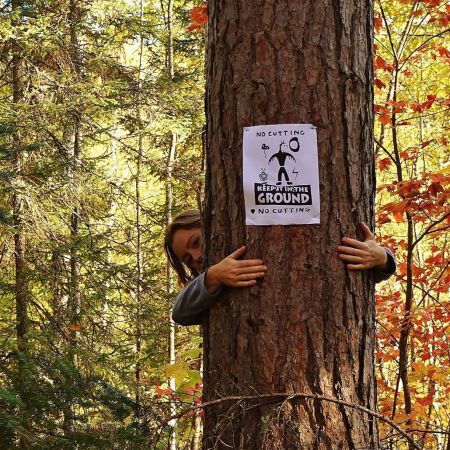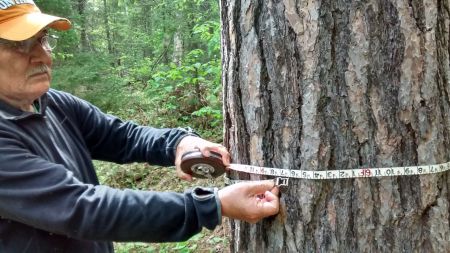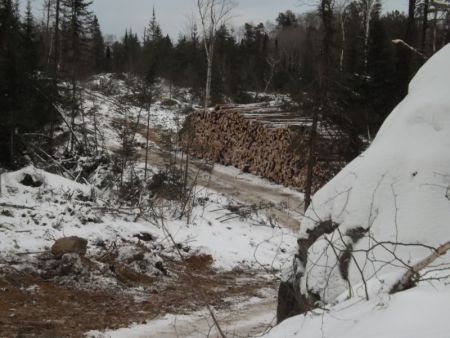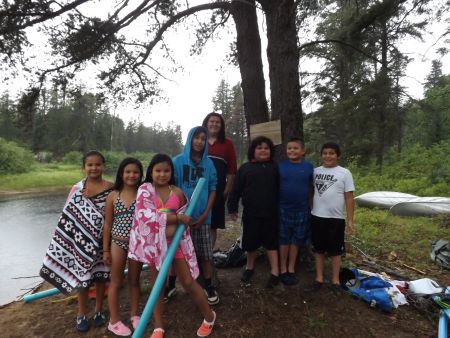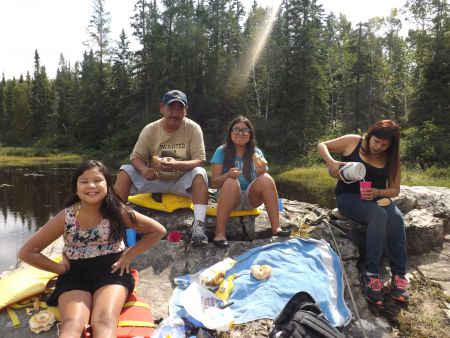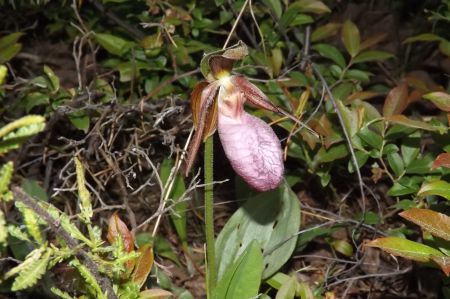Defend the Benny Forest Group Off the Ground
A new Sudbury community group that calls itself ‘Defend Benny Forest” emerged last Fall after Barbara McNichol was charged with mischief for blocking some logging trucks in the Benny Forest. It now has a real fight on its hands as new cutting in the centre of the forest is underway. Forester Eacom hired Transport Hardy Inc., a company from Val D’Or Quebec after local contractor Gervais Forest Products Limited based in Falconbridge was directed to stop their work on the new logging road Ms. McNichol was protesting. According to co-chair of the group Howard Wideman, a former logger, this is a common practice when there are complaints. The local contractor stops and another company from further away comes in to be the “bad guys”. According to this group, what they are doing now is just too wrong. Ms. McNichol’s husband Clyde is an ancestral rights holder of the Anishinabek nation whose family have lived in the area since time immemorial. Together they have been standing up to loggers and asserting rights to the land since April of 2015.
They are joined by numerous citizens who are deeply concerned about the extent and methods of logging currently in practice. People are increasingly aware, for example, that there is very little old growth left at all, and old growth trees are far superior at protecting climate change than younger trees. They also are aware that current forest management practices involve aerial spraying of toxic chemicals designed to prohibit growth of plants thought to compete with tree species most desired for commercial purposes, and that these chemicals get in the water stream and cause illness. They are more aware that vast tracks of formerly pristine forest have become one or two species tree farms uninhabitable by many of the original species. Bears can no longer find sufficient blueberries and are losing their habitat, for example. More and more people are saying enough is enough and looking for ways to help.
The Defend Benny Forest group is also joined by citizens who have come to value Anishinabek culture and are appalled at the policies Canada put in place to extinguish it, such as the residential school system and Indian Act reserve system. Anishnabek culture is a culture of kindness, based on living in harmony with other species on healthy land. Clyde is standing up for all the Anishnabek descendants and their families and friends who value their original teachings and way of life, he says. Many descendants of the clans who lived across this area are now members of Atikameksheng Anishnawbek, Sagamok, Wikwemikong and other Indian Act “First Nations.” Their well-being has been so compromised since colonization that few have the means to enjoy the land that is their rightful inheritance, and many of the teachings about how to take care of it have been lost. That is one reason he and his wife started Camp Eagle Nest. Due to poverty, many First Nations youth lack the opportunity to be out on the land in the summers. Many also lack opportunities to learn their culture. The camp brings elders with traditional knowledge together with children and youth in a healthy learning environment on the land.
Clyde is making a claim to protect the land within a 20 mile radius around Benny, which, according to their elder, former Chief Art Petahtegoose of Atikameksheng Anishnawbek, was a common measure of the original hunting territories that were scattered across their traditional territory before colonization – not more than one day’s walk from the clan village or home. Only an area that could supply all the family’s needs was chosen and boundaries were clearly known by others and respected. Permission was requested and usually accommodated when others wished to hunt, fish or gather from that land. Violators were punished, occasionally by death. The size of the territory was not so large that the family and headman could not know all plant and animal families intimately – families themselves with heart and spirit needing careful stewardship and protection. The number of beaver taken from any one lodge, for example, was strictly limited to ensure the beaver family would stay healthy and abundant. Apologies and thanks were given when any animal, fish or plant was taken for food, shelter, clothing or medicines needed for the clan’s survival.
Clyde and his supporters have a vision of the land being governed from the perspective of Anishinabek world view, law and protocol. The following are some examples of what that might look like, he says:
o There shall be no commercial logging. Only local cutting of trees for residents’ needs i.e., firewood, housing, fencing, native uses, etc. will be permitted. Only dead trees can be used for personal wood stoves, camp fires etc.
o There shall be no aerial spraying, flooding, dam construction, toxic waste dumping or other commercial disturbances that harm the fish and animals.
o Respectful use of the land by outside canoeists, hikers, light campers, and other visitors will be encouraged. There will be a forest regeneration research centre, strong Anishinaabemowin language revitalization programs, cultural camps, and a trail system where visitors can go on tours or explore independently making use of lodges or tipis for overnight shelters throughout the area.
o Outside experts and supporters will be engaged to help regenerate the forest in such a way that it returns to health, and is able to again support all the original plants, fish and animals in balance and abundance
How you can help:
Join the Defend Benny Forest community group by sending your name and contact information to Co-chair Howard Wideman at 705-692-3388/hwide4@yahoo.ca or Barbara McNichol at 705-690-3844/ronson.mcnichol@gmail.com.
Write to Hon. Kathryn McGarry, Minister of Natural Resources and Forestry, to urge her to stop the logging until the land claim issue can be considered.
Address:
Hon. Kathryn McGarry, Minister of Natural Resources and Forestry
Suite 6630, 6th Floor, Whitney Block
99 Wellesley St. W.
Toronto ON M7Z 1W3
E-Mail: kmcgarry.mpp.co.liberal.ola.org
